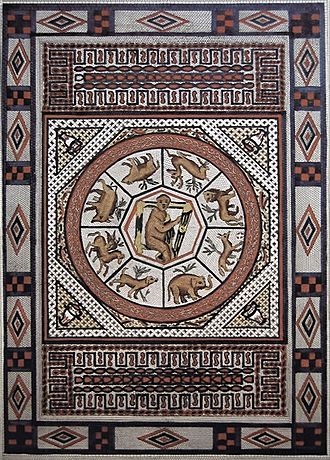Winterton Roman villa facts for kids
Quick facts for kids Winterton Roman villa |
|
|---|---|

The Orpheus mosaic from Winterton villa
|
|
| General information | |
| Architectural style | Romano-British Villa |
| Location | Winterton, North Lincolnshire |
| Country | United Kingdom |
| Construction started | c.2nd century |
The Winterton Roman villa is an ancient Roman villa (a large country house) located in Winterton, North Lincolnshire, England. It was first found by people in 1747. This important site helps us understand how Romans lived in Britain many centuries ago.
Contents
Discovering the Roman Villa
The Winterton Roman villa was originally built around the 2nd century AD, which means it's about 1,800 years old! Later, in the 4th century, it was rebuilt and made even bigger.
Archaeologists, who are like history detectives, have dug up parts of the villa many times. Between 1958 and 1967, a famous archaeologist named Ian Stead led a big project to explore the site. Thanks to his work, Winterton became one of the most completely understood Roman villas in England. This means we know a lot about its layout and what life was like there.
What Was the Villa Like?
The villa was not just one building. It was a whole group of buildings arranged around a large courtyard. This courtyard was about 90 meters (300 feet) wide. The buildings included homes where people lived, farm buildings for animals and crops, and even three different bath-houses! Roman bath-houses were like ancient spas where people could clean themselves and relax.
Amazing Mosaics
During the excavations, archaeologists found five large and beautiful mosaics at the Winterton villa. Mosaics are pictures or patterns made from many small, colored pieces of stone or glass.
The Orpheus Mosaic
One of the most famous mosaics found here shows the mythical figure of Orpheus. Orpheus was a musician in ancient Greek stories who could charm animals with his music. This particular Orpheus mosaic is one of only thirteen like it found in Roman Britain. It's also one of the two most northern examples, with the other being at the nearby Horkstow Roman villa.
The Fortuna Mosaic
Another important mosaic shows Fortuna, the Roman goddess of luck. This mosaic, along with many other items like pottery, coins, and glass, is now kept at the North Lincolnshire Museum. These objects help us learn even more about the people who lived at the Winterton Roman villa long ago.
 | Roy Wilkins |
 | John Lewis |
 | Linda Carol Brown |

